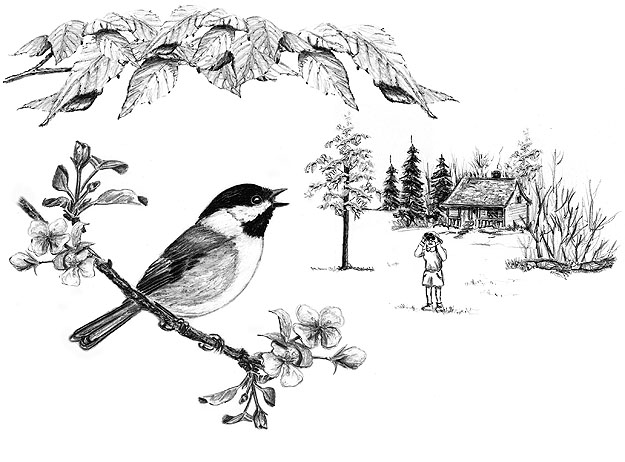
Dear Bird Folks,
I recently borrowed some bird song CDs from the library. I wanted to match the songs I hear with their owners. The trouble is, there are 272 different birds on these CDs. The task would be easier if I knew which birds I am likely to hear in my backyard. Any help would be appreciated.
– Kathy, E. Dennis, MA
Not the Library, Kathy,
Do you know how dangerous it is to borrow bird books and CDs from the library? Stuff from the library is always covered with germs. And if you are talking about a “public” library, it’s even worse. Who knows how many members of the public touched those CDs before you. It’s like taking home a stack of used Petri dishes and passing them around to your family. Libraries are treacherous. Oh, okay, fine. It’s not true. Libraries are perfectly safe. With the recession going on I’m just a little sensitive about people “borrowing” bird books and CDs instead of buying them from hardworking merchants. I take it all back. You won’t get germs from borrowing CDs from a library. However, you’ll go blind if you feed breadcrumbs to birds instead of buying expensive birdseed. That’s a fact.
Which birds are you going to hear in your backyard? Probably not too many right now. It’s early September and most of the birds have stopped singing for the year. Birds use their songs to attract a mate and to announce a territory. Once the breeding season is over so is the singing. In addition, most birds are going through their annual molt right now. Molting birds can look a little ratty while they wait for their new feathers to grow in. The last thing birds want to do is draw attention to their rattiness by singing. In fact, September is a lousy time to even write about birdcalls. That’s a May topic. But since you took the time to write, Kathy, and I don’t have any other questions to answer this week, I’m going for it. We can pretend it’s May and that Memorial Day is coming up. That should confuse a few folks.
When it comes to learning bird calls, I have one piece of advice: Go outside. Forget listening to CDs, free or otherwise. The best way to identify the sounds that birds make is to go outside and watch them sing. Really. I’ve listened to all of the recordings – from records (remember them?), to tapes (remember them?), to CDs and MP3s, but nothing helps me cement a call in my brain better than seeing the actual bird sing it. You might find this hard to believe, but I’m not a teenager; however, I still watch MTV and VH1. Why? (No, it’s not because I look like one of the guys on The Jersey Shore.) I find that seeing a music video on TV helps me identify the name of a band when I hear their song on the radio. The same theory applies to birdcalls. Seeing a bird sing makes all the difference.
Anytime I hear a strange bird song, I don’t run inside and start playing CDs. I track the bird down. Sometimes it takes me a few minutes, hours or even days to find the bird, but when I eventually find it I remember it forever. Every day people come into my shop with a “mystery” birdcall that they want me to help them identify. They say the bird is “driving them nuts.” I want to tell them to go find the bird, but being the well-mannered person I am, I always politely listen to them imitate the mystery song. Actually, I don’t listen to be polite. I enjoy watching folks stand in the middle of a crowded store, squawking like a jay or a mockingbird. It’s another way to help us make it through the recession.
Some people find mnemonic phrases a helpful way to learn birdcalls and songs. A few classic ones are the “Drink your tea” song of the Eastern Towhee and the “Old Sam Peabody” song of the White-throated Sparrow. We even sell something called a Tweeter Cheater, which is a list of mnemonic phrases designed to help us remember calls. But the trouble with mnemonics is that we all hear birds say different things. For example: The chickadee’s signature song is a clear two or three note whistle. Some people think the birds are saying “feee-bee,” while people like me hear “chi-ck-a-dee” and still others hear “cheeeese-burger.” (I’m not sure who came up with that one, but the person probably worked for McDonald’s.) If you want to use a phrase to help you remember a song, invent your own. My birding friend, Fahy, swears that Chestnut-sided Warblers say, “I want a Mitsubishi.” That weird phrase works just fine for her, but I find it hard to believe that any bird would want a Mitsubishi.
One last comment about bird recordings is that they can be misleading. Birds are a lot like people. The way they sing depends on where they are from and where the recording was made. Birds from New England don’t sound exactly like the ones from the South. Except birds from the South don’t ever say “y’all.” That even sounds weird to them. Even though I sell bird recordings, Kathy, I think fieldwork is the best way to learn their calls. But don’t worry about it now; the birds won’t be doing much singing until next spring. Then chickadees, cardinals, orioles, finches and titmice will all fill your yard with wonderful songs for you to learn. In the meantime, I suggest you wash your hands after touching those CDs from the library.